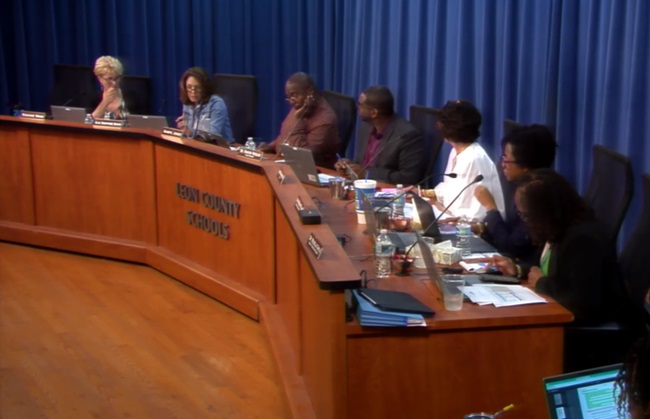On Tuesday, the Leon County School Board will consider a new policy related to public speaking at Board meetings. The policy revision was driven, in part, by a legal case involving a Mom’s for Liberty lawsuit in another Florida school district.
The policy, which was discussed during the Monday agenda review meeting, will be revised and presented at Tuesday’s business meeting to limit the total time allowed for the public to speak to 60 minutes. Under this revision, if there is more than 20 speakers, speaker time will be prorated.
The policy notes that “The School Board recognizes the value to school governance of receiving input from the public. To maintain orderly conduct and proper decorum at its meetings, this policy sets forth the Board’s view point neutral rules related to public input at Board meetings, which are limited public forums.”
In most cases, the policy limits public input to a “a proposition before the Board.”
A proposition is an item before the Board for a vote, and includes, but is not necessarily limited to, all items on the agenda noted as unfinished business, consent, and nonconsent. A proposition may also include a vote on a motion to rescind or to amend action previously taken, but does not generally include items on the special order agenda.
The policy notes that a proposition does not include items related to emergencies, ministerial acts, a meeting that is exempt from F.S. 286.011 (the Public Meetings Law), and a meeting at which the Board is sitting in its quasi-judicial capacity.
The portion of the meeting during which participation of the public is allowed will be limited to a total of three (3) minutes, unless adjusted by a vote of the Board. Public input will be received prior to the Board taking official action on a proposition.
The policy provides a list of items that an individual must adhere to when speaking. These items include:
A. Individuals desiring to provide public input must complete a public input form with their name and identify the proposition or matter on which the individual desires to speak.
B. Individuals will be given the opportunity to speak in the order in which their form is received.
C. Each individual speaker shall be allotted up to a total of three (3) minutes. The time period may be adjusted by the presiding officer.
D. Individuals who have filled out the Board’s public input form may not delegate their allotted time to speak to other individuals.
E. If the number of individuals signed up to provide public input exceeds the number of minutes designated for public input, the total allotted time for public input may be prorated evenly among all individuals who have completed a public input form.
F. Rather than all member of groups or factions desiring to speak on a particular matter at meetings in which a large number of individuals wish to be heard, the Board encourages representatives of such groups or factions to address the matter in their representative capacity.
G. Individuals may not utilize any demonstrative aids when providing public input.
Additional Rules of Decorum and Conduct
The policy also details additional rules and decorum that must be followed.
The presiding officer may request that a law enforcement authority or sergeant-at-arms designated by the presiding officer remove a disorderly individual when such individual fails to adhere to the Board’s rules after being warned that continued interference with the orderly processes of the meeting will result in removal.
In the addition, the presiding officer may:
— stop, interrupt, or warn, an individual when a statement is repetitive, obscene, and/or a true threat;
An obscene statement may include, but is not necessarily limited to, language or gestures that are crude, abusive, vulgar, offensive, pornographic, or indecent. A statement that is threatening in nature is one containing language meant to frighten or intimidate one (1) or more specified persons into believing they will be harmed by the speaker or someone acting at the speaker’s behest. An abusive statement shall be understood to mean containing language that is harsh, insulting, cruel, or malicious.
— stop, interrupt, or warn an individual when a statement is not related to a proposition before the Board;
— stop, interrupt, or warn an individual when the individual shouts, uses profanity, causes a disruption to the Board’s ability to maintain orderly conduct and proper decorum, or engages in conduct that constitutes a violation F.S. 877.13;
— request any individual to stop speaking and/or leave the meeting when that person fails to adhere to the Board’s rules of decorum and conduct;
— call for a recess or an adjournment to another time when the lack of public decorum so interferes with the orderly conduct of the meeting as to warrant such action.
The policy will be considered at the February 11, 2025, Board meeting at 6:00 p.m. at the Aquilina Howell Center, 3955 W. Pensacola Street.

